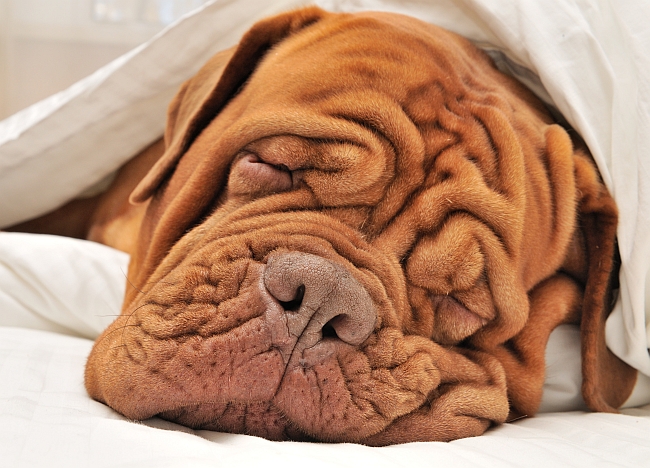
That fuzzy pup is the love of your life, but one more minute of snoring might drive you insane! Save yourself the frustration of just “dealing with it” and figure out how to solve the symphonic problem. Consider the tactics below to figure out how to eliminate the cause of your dog’s snoring. The sooner you make some of these below changes, the sooner you will be able to enjoy some well-deserved, uninterrupted shut-eye.
Remedy the snoring
- Change the environment. Open windows, move furniture for better air flow, adding fans and air purifiers to the room where your dog sleeps. Also consider moving his bed to a different place in the house, such as under a window where fresh air might waft in. If it is the air itself which is causing the sniffles, then move him to a still room where he can breathe purified air in peace. Add a humidifier to the room to bring in moisture and help clear sooth agitated nasal passages.
- Clean up! There is no way around it; deep cleaning is a necessary measure of protecting your dog from unhelpful germs and allergens that might be contributing to the cacophony of snoring. It is time to get out the mop, wipe up the dust bunnies, wash the sofa cover and pillows, and dust the blinds. Throw out or wash his dog bed, and keep cozy cushions from becoming a hub of allergens by vacuuming them regularly. Rid the house of allergens and you will even start feeling better too!
- Change his diet. Reliable pet food companies create hypoallergenic food products for a reason. Review the current product that your pet is consuming, and research to see how it is actually contributing to his overall health. Most dog food companies make production short cuts by adding useless fillers that agitate canine digestion, exacerbate allergies, or are filled with flavorful fats and sugars that increase obesity. Be informed about your dog’s nutritional needs; and consider how to fight snore-causing obesity by staying active with your pet.
- Give your pup a pillow. Before you go to bed, make sure your pup’s head is propped up on his pillow, as the elevation might help reduce the snoring. Some dog owners have also found that when dogs sleep in snug, round beds that force them to curl up, they are less inclined to sleep on their back. The snuggled position helps them keep the noise to a minimum.
- Avoid the smoke: Be careful to stay distanced from your dog when you, or anyone in the house is smoking. If you insist on smoking indoors, then make sure you keep the windows open and fans on so he will not get stuffy.
- Avoid outdoor allergens. If seasonal allergies are a problem, help protect your dog from congestion. Avoid taking him outside when there will be a higher concentration of allergy-infested air. Do not take him for a walk by a newly mowed lawn, or (if you are a city-dweller) in times of heavy smog and pollution during rush hour traffic. If his throat and nose are still scratchy, consider giving your dog a snout soothing spray or oral tablets. Products like these decrease inflammation of the breathing passages, and help fight snoring.
- Consider surgery. Since several dog breeds are more likely to snore than others due to their limited nasal cavity, there is also the possibility of getting a minor surgery to solve the problem. This procedure decreases snoring by removing some of the extra tissue in the throat or nasal cavity which inhibits air flow. Most veterinarians recommend opting for surgery early on in a dog’s life.
If all these options fail, one other solution is to inconvenience yourself with some trusty ear plugs! It certainly is worth trying for a night of peaceful serenity and sleep.

